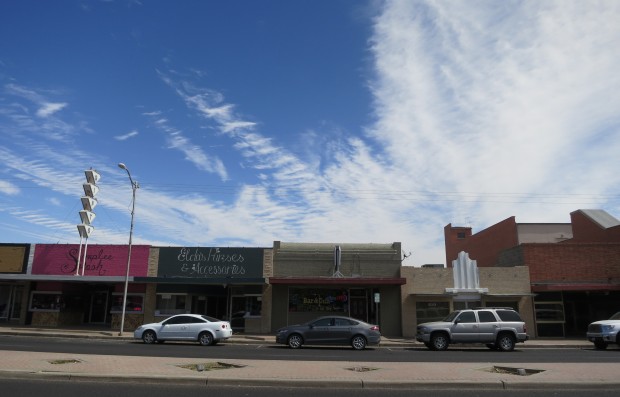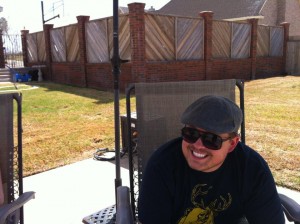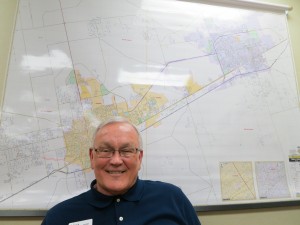Locals Sing the Boomtown Blues in West Texas and Beyond

Photo by Mose Buchele
Downtown Odessa Texas, despite having a roaring hot economy, some storefronts remain empty in the oil-rich Permian Basin.
The Midland-Odessa region in West Texas has the highest GDP growth in the country, the lowest unemployment in Texas. This is oil country, and oil is one of the most profitable products in the world. But if you ask someone what it’s like to live there, don’t be surprised to hear answer like this:
“It’s terrible.”
During a recent visit I heard that sentiment from oilfield hands and office workers alike. One roughneck I ran into at an Odessa doughnut shop agreed to share his opinions anonymously. (He didn’t want his name included in this story because his company has a policy against talking to reporters).
“Everything’s overpriced, the food is overpriced, living is overpriced,” he said.
And that was just the start. His other complaints: housing is impossible to find, rents are high, traffic is terrible, crime is bad and there’s nothing to do.
“Everybody’s just trying to make as much as they can, wait for this boom to be over and get out,” he said.
The bad reputation has been around for a while. Texas writer Larry McMurtry dubbed Odessa “the worst town on earth” in his novel Texasville. But these days many natives – even those who may have defended the area before the boom – have taken to venting about local problems online.
“When people ask, ‘what is there to do here?’ people say ‘go to the airport and fly somewhere else,’ because that’s about the only thing you can do,” Midland native Jaret Burkett, who started the popular Facebook page Midland Texas Memes and Jokes told me.

Photo courtesy of Jaret Burkett
Jaret Burkett created the popular facebook page Midland Texas Memes and Jokes.
I asked him what are some of the good parts to life in the Permian Basin. “There are jobs,” he said.
Here’s where I need to mention that Midland and Odessa are two separate towns with two separate reputations: one is said to be more white collar, the other more working class. One is corporate, the other a little edgier.
There’s even a saying: “you raise your kids in Midland, you raise hell in Odessa,” Burkett said.
But the oil boom has pushed the two cities closer economically and geographically. And most of the problems people talk about in both towns aren’t happening despite all that prosperity, but because of it.
The Boom Town in Theory and Practice
“This is a pretty well know phenomenon, we have ghosts towns and boom towns,” Susan Christopherson, a professor of City and Regional Planning at Cornell University, said when I told her about what I had heard from people in Midland-Odessa.
She said a lot of the negatives mentioned in doughnut shops and on Facebook pages, are mirrored drilling towns from North Dakota, to Pennsylvania.For example, it’s a common complaint that there’s ‘nothing to do.’ And indeed, despite being economically vibrant, empty storefronts are still a fact of life in Midland-Odessa.
Christopherson said the reason could go back to the boom-bust cycle. In the 70s a massive oil boom flooded the region with jobs and money. In the early 80s, the bottom fell out and a lot of people lost a lot of money.
“Because of the boom bust cycle investors are scared off,” she said.
And when it comes to the housing shortage: “Who would build housing?” asked Christopherson.
“If they’ve been through it before, they know that there’s going to be a population decline and those houses are just going to sit empty,” she said.
In some communities that reluctance to invest can extend from individuals to entire cities.
Other times, local governments will respond by spurring construction. In Midland there’s even a plan to give tax breaks for a downtown skyscraper. But history indicates that could be a risky prospect.
“The question,” Christopherson said, “is who is going to be there after the drilling rigs leave?”
Tumbleweeds
Like the guy I met at the doughnut shop, the huge influx of businesses and workers will likely not stay around if this boom busts.
“Once everybody leaves it’s gonna be tumbleweeds coming down here,” he said, “places are gonna close.”

Photo by Mose Buchele
Guy Andrews is in charge of economic development for the Odessa Chamber of Commerce.
To avoid such a fate, Christopherson said, boom towns need to diversify by bringing in other industries, and sock up money for lean times. But that’s a tricky proposition.
“To tell the truth that’s the exception. More communities end up in worse shape than in better,” she said. “By far.”
The people tasked with doing that are usually city employees and representatives of the local chambers of commerce. Earlier this year I met with one of them.
Guy Andrews is the director of economic development for the Odessa Chamber of Commerce. He said there’s something about Odessa, underneath all the problems and prosperity that will ensure its prosperity. He described it as a kind of small town feeling. Something that might not be appealing to everyone but will convince some new residents and businesses to stay and invest in the community.
“If you like conservative American beliefs. You know, baseball apple pie, Chevrolet, it’s all part of who we are out here,” he said.
It’s just that currently, with the frantic pace of change, Andrews likened trying to solve the near daily addition of challenges to “trying to drink out of a fire hose.”
Support for KUT’s StateImpact Texas Roadshow comes from The UT Energy Institute.
